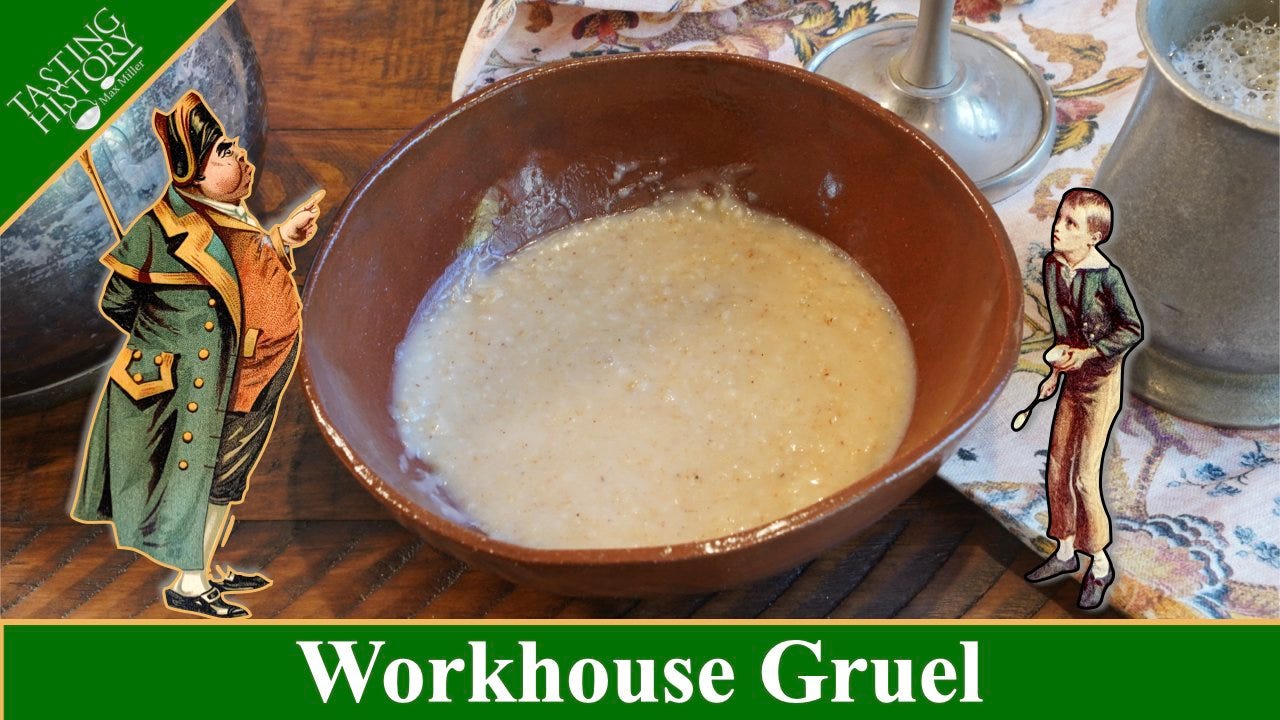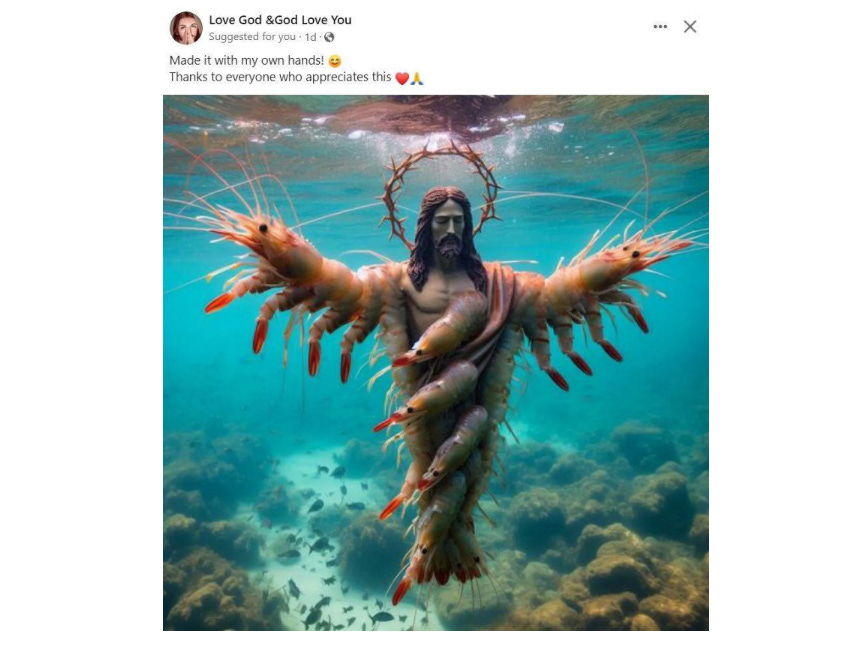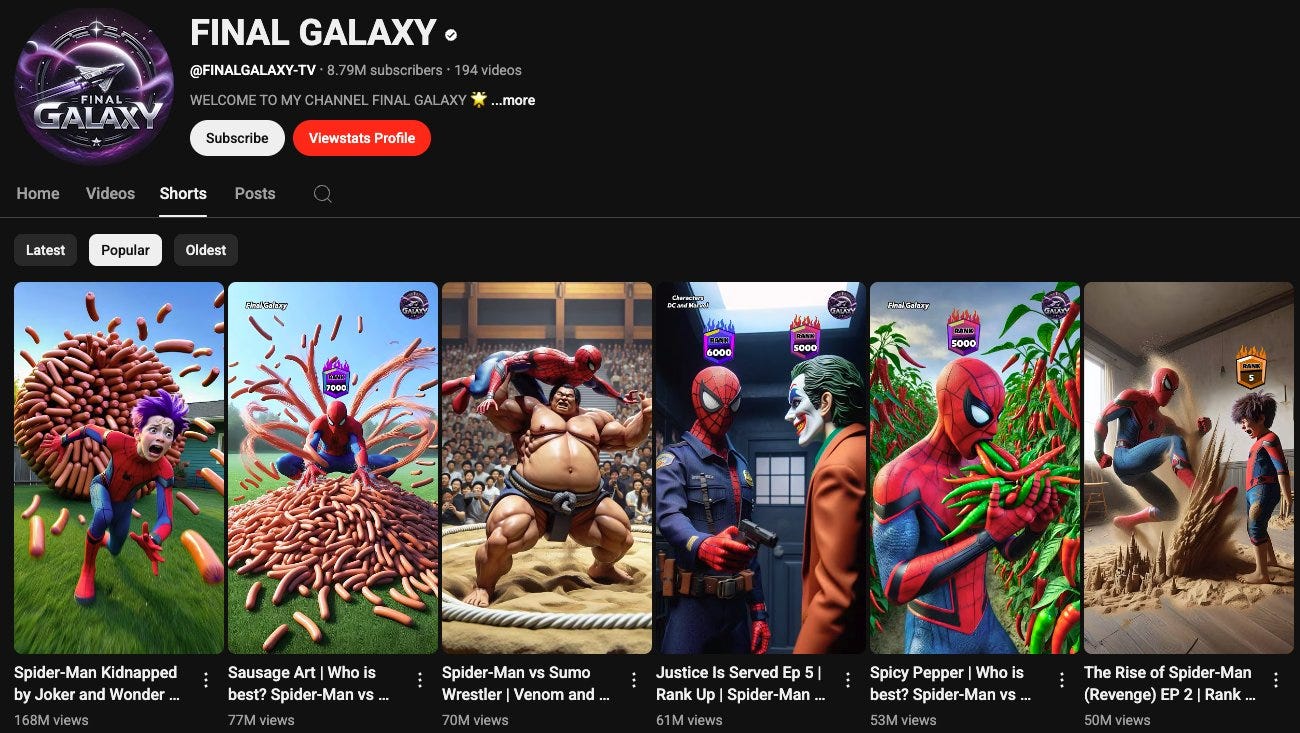Stop Calling Everything Slop
The degradation of a once-useful term
To listen to online culture writers, we we’re surrounded by slop. There’s AI slop, of course, which I’ve written about many times. But now all forms of entertainment are slop. There’s streaming slop and TikTok slop. All of modern pop music is slop. Taylor Swift is especially slop. Marvel is slop, Harry Potter is slop, Netflix is slop. Polygon declares we’re in the slop era of entertainment while Garbage Day declares this the Age of Slop.
We’re not safe even if we turn our backs on movies and TV. Temu and Shein are slop clothing. Chipotle burritos and Sweetgreen salads are definitively slop, proclaims the New York Times. Slop is infesting our interviews and our corporate strategy and our video games. At all times, it seems like we’re surrounded by slop.
Arguing about the definitions of words may the lowest form of discourse that exists, but I’m sorry, I can’t allow this any more. We have to stop doing this. Not everything is ‘slop’.
What is Slop?
Ryan Broderick gave one of the more coherent definitions for this new, expansive usage of slop last year:
Content slop has three important characteristics. The first being that, to the user, the viewer, the customer, it feels worthless. This might be because it was clearly generated in bulk by a machine or because of how much of that particular content is being created. The next important feature of slop is that feels forced upon us, whether by a corporation or an algorithm. It’s in the name. We’re the little piggies and it’s the gruel in the trough. But the last feature is the most crucial. It not only feels worthless and ubiquitous, it also feels optimized to be so.
I love this as a piece of prose. Three characteristics: Feels worthless, feels forced upon us, feels ubiquitous and optimized. Piggies at the trough! Very evocative, great stuff. But if you look closely, you’ll notice how vague it actually is. Every single one of the three markers of slop is preceded by ‘feels’. It feels worthless or forced. But felt by whom? Broderick continues:
The Charli XCX “Brat summer” meme does not feel like slop, nor does Kendrick Lamar’s extremely long “Not Like Us” roll out. But Taylor Swift’s cascade of alternate versions of her songs does. The jury’s still out on Sabrina Carpenter. Similarly, last summer’s Barbenheimer phenomenon did not, to me, feel like slop. Dune: Part Two didn’t either. But Deadpool & Wolverine, at least in the marketing, definitely does.
Notice again the primacy of how Broderick individually ‘feels’ at every stage. Taylor Swift is slop, Kendrick Lamar isn’t. Dune: Part Two isn’t slop but Deadpool is.
I find this curious. Taylor Swift is slop, with her ubiquitous Eras Tour and her endless alternate versions of songs. But Kendrick Lamar isn’t? Not Like Us, over the last year, was pushed by the exact same corporate machines that push Taylor Swift. If anything was ubiquitous, Not Like Us qualifies. It hit #1 on the charts multiple times. It had multiple versions released. It played at the Super Bowl halftime show. It won every Grammy. Hell, Kendrick got his own Amazon sponsored, special live-streamed event where he played Not Like Us six times in a row!
Similarly, I have a hard time explaining how exactly Deadpool vs Wolverine is slop but Dune: Part Two isn’t. They’re both well known IPs. They’re both sequels. They’re both pushed by major movie studios featuring A-list Hollywood talent. Deadpool’s real sin seems to be that it’s not trendy enough. Ryan Reynolds is lame now. Deadpool sequels don’t appeal to Brooklyn hipsters, it appeals to people who are culturally cringe.
Somehow the term slop has turned from a specific phenomenon into a wider designation of ‘this thing I don’t like’, and I hate it.
Slop Is Fake News
The best analogy for how the meaning of slop has degraded over time is ‘fake news’.
Many people don’t remember that when the term fake news first popped up in 2016, it had a very specific meaning. Fake News meant stories with titles like STUNNER: POPE ENDORSES DONALD TRUMP or HILLARY HAS TERMINAL ASS CANCER, THREE WEEKS TO LIVE. They were published on completely fake sites like PatriotTruthUSA.net and had absolutely no connection to reality whatsoever. They were frequently posted on Facebook and often outperformed traditional news.
That lasted for about two weeks, before Donald Trump learned of the phrase and started calling anything he disagreed with fake news. CNN was fake news, NBC was fake news, etc. People, institutions, and even inanimate objects could be fake news. The term quickly dissolved into nothingness and lost any semblance of its original meaning. It’s now just an epithet you hurl at someone you dislike.
Similarly, ‘slop’ as a term used to mean something specific. It meant AI-generated images, almost always shared on Facebook by credulous boomers who posted “Amen!” in the comment section.






Slop, in this strict original definition, is highly akin to fake news. They’re both material that’s obviously fake, mass produced, and primarily spread on Facebook with a sense of unreality so strong that you’d wonder how anyone on Earth could believe that kind of content.
This original definition of slop was useful for describing a specific phenomenon. The new use of slop is so wide to have become useless. In what sense is a salad from Sweetgreen slop? In no sense whatsoever, other than the writer’s opinion that Sweetgreen salads are passé.
The Cultural Origins of Bad Language
One of the best essays I’ve ever read is Politics and The English Language by George Orwell. The essay is largely about how political speech is virtually always low quality, degraded speech - but there’s a corollary about why people abuse and twist language in the first place. Orwell says:
The great enemy of clear language is insincerity. When there is a gap between one’s real and one’s declared aims, one turns as it were instinctively to long words and exhausted idioms, like a cuttlefish spurting out ink.
When the English language is stretched, mangled and abused it’s often caused by the speaker’s ulterior motives. They can’t or won’t say precisely what they mean, so instead they stretch existing terms until they break.
Slop, in its new usage, is code for anything the writer is too cool for. There’s absolutely nothing that cultural commentators love more than looking down on the plebian masses and their unrefined taste, but to do so too openly invites backlash. You simply can’t say that a piece of culture or a trend might be fun for idiots, but that you’re too smart to enjoy it.
This, I would posit, is the real purpose of using the word ‘slop’: positioning yourself as one of the cool kids without overtly coming off as an elitist prick. It’s anti-corporate in a very safe, sanitized way. It allows the writer to feel superior not because they’ve said anything enlightening but because of their cultural positioning. Even worse, ‘slop’ usually indicates a form of betrayal: this thing used to be cool. Taylor Swift used to be original. Marvel used to be awesome before they sold out. But now they’re both slop. The definitions here are mangled because the author is too embarrassed to simply proclaim themselves a snob.
No more! I’m sorry, but I have to put down my foot. I will be the vocabulary police. You don’t get to call whatever you want slop. Slop already has a meaning. If I don’t like your article, I don’t get to call it Article Slop just because I find you to be unbearably tacky.
Marvel movies are not slop. They’re churned out for the masses, sure. They’re formulaic. But movies and TV have always been this way! It used to be much, much worse! When studios realized that Shirley Temple was a cash cow, they put her in a whopping 18 movies in just three years. Do you think all of those films were works of genius by singular auteurs? Of course not, they were just mass-appeal movies. Mass appeal is not slop.
Taylor Swift is not slop. She’s a talented and award-winning artist who you simply don’t like right now because she’s overexposed and she’s historically been popular with teenage girls. Calling Taylor Swift slop says more about you than it does about Swift - it says that you can’t see past the bizarre cultural status games you’re caught up in.
Chipotle is not slop. Fast casual salad spots are not slop. This is a particularly galling misuse of slop because most lunch bowl restaurants like Sweetgreen have a solid reputation for fresh, healthy ingredients. They’re displacing much unhealthier, more sloplike options like McDonald’s or Subway. Hell, people used to eat literal mushy slop! What are we even doing here?
What really counts as Slop
As the new Czar of slop, I have some rules. The few examples I’ve listed below are the only things you’re allowed to refer to as slop.
AI generated images of Shrimp Jesus on Facebook
This is the original, truest form of slop. Carry on.
Mass-produced, AI generated YouTube Shorts or TikToks
This is the closest descendant of the original meaning of slop. Here’s a good example:
These videos are almost always aimed at small children, highly religious aunties, or both. They’re mass-produced by anonymous channels whose homepages look like this:
Extremely cheaply produced clothing
As Slop Czar, I’m going to allow one usage deviation from away from slop’s correct meaning of AI-generated and mass-produced imagery. And this is because of a historical loophole - did you know that Slop Clothing is a term for cheap, low-quality clothing dating back to the 1600s? Be honest - even those of you who’ve called Shein clothes slop didn’t actually know that.1 You’re correct on accident, but I’ll begrudgingly allow you this exception.
And that’s it. To the rest of you: Find a new word, you lazy assholes.
I’ve looked, and haven’t seen a single essayist who’s connected the historical usage of slop clothing with modern day slop yet. We deserve a better class of culture writers.





"Slop" is the just newest way that people say the things that they dislike is Objectively Bad.
I don't mean to brag, but I knew this the second that word started to enter the mainstream. Like with "Enshittification"
Broderick gives the game away by saying that "Brat Summer" is *not* slop. That meme was the most insincere, inorganic and ubiquitous BS of the year - if anything in pop culture is slop, it's Brat Summer.